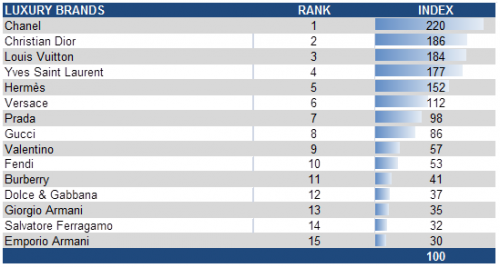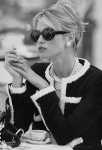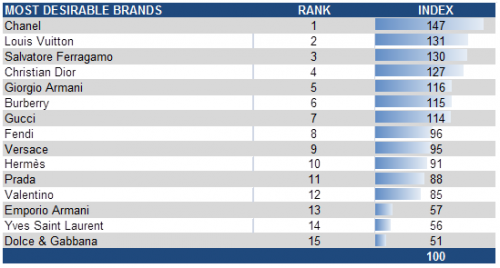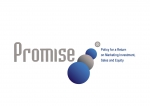POUR DEMANDER LA NOTE D'ANALYSE PROMISE-BNP EXANE, ENVOYER UN MAIL :
TO ASK FOR THE RESEARCH NOTICE PROMISE-BNP EXANE PLEASE E-MAIL:
valerie.jourdan@promiseconsultinginc.com
Paris May 18th 2015 - In association with BNP Exane, a leading actor of the financial market in Europe and a recognized specialist of research and cross-section analysis on the European equities, Promise, consulting and market research firm, publishes the results of the 1st wave of the Barometer Promise - BNP Exane "Luxury and Desirability 2015". This barometer classifies the 15 most exclusive and desirable brands in France in the sector of Fashion. This Barometer is established with the wealthiest women and consists of ready-to-wear clothing, bags, shoes and accessories brands stemming from the ranking Industry Interviews,Exane Paribas Estimates & Analysis (2014).
"This barometer in association with BNP Exane translates our will to move closer to the marketing and cross-section financial analysis. Our approach Monitoring Brand Assets® itself complements analyses led by BNP Exane’s experts. The results obtained from our joint barometer based on two different angles of expertise, marketing and financial, bring a unique added value to the managers and decision-makers in the Luxury sector. More concretely, our measure of the exclusivity of a brand takes into account the superior and more constant quality of products, the strong and unique valuation of the customer, the prestige of the brand, but also a matchless savoir-faire that justifies a very high price associated with luxury. Finally our measure of desirability synthesizes the dimensions of attractiveness, intimate, social and symbolic order which are the strengths of exclusive brands and the particular relation that they maintain with their customers. In this respect, our Barometer synthesizes in two proven scales the numerous criteria to establish a classification between the high-end brands from the point of view of their customers” states Pr Philippe Jourdan, Promise’s CEO.
IN BRIEF
EXCLUSIVITY
- Chanel 1st brand on the luxury criterion with the wealthy Frenchwomen.
- In 2nd and 3rd place, Christian Dior and Louis Vuitton are neck and neck.
DESIRABILITY
- Chanel is the most desirable brand in the world of fashion.
- In 2nd place, Louis Vuitton confirms the legitimacy of its upmarket move.
- The Italian brands opt for seduction to stand out.
- Burberry is ranked 6th on the most desirable brand scale (11th on high-end luxury).
EXCLUSIVITY: FRENCH BRANDS AT THE TOP OF REFINEMENT
The wealthiest French women agree on one point: the high-end luxury remains the privilege of France. In the ranking of the 15 high-end luxury brands, national brands monopolize the 5 first ranks in the heart of French women. The first rank is occupied by Chanel, followed by Christian Dior, Louis Vuitton, then Yves Saint Laurent and Hermes (cf. table 1).
TABLE 1: THE 15 MOST LUXURY BRANDS IN FRANCE
(basis: wealthy women only)

Brands classified on the mark of 5 on a scale of 1 to 5 then translated into index.
 Chanel takes the lead of the classification in 2015 in the world of fashion (ready-to-wear clothing, bags, shoes and accessories). The brand deserves this crowning as a result of an exceptional development in Haute Couture, ready-to-wear, bags, accessories, jewelry and fragrances.
Chanel takes the lead of the classification in 2015 in the world of fashion (ready-to-wear clothing, bags, shoes and accessories). The brand deserves this crowning as a result of an exceptional development in Haute Couture, ready-to-wear, bags, accessories, jewelry and fragrances.
“The refinement of its collections of Haute Couture, the success of its collections Croisières and Ready-to-wear clothing, its tributes to Art Craftmanship in different cities every year and the investment in the field of the High-end Jewelry since 1987 all drive the ascent of the brand at the forefront. This result is thus, not surprising and rewards a consequent, coherent, qualitative and long term investment" according to Philippe Jourdan.
 Ranked 2nd and 3rd, Christian Dior and Louis Vuitton are very close in terms of index. "Through Christian Dior Couture, French women express their attachment to a typical French brand to which they recognize undeniable qualities: the search for excellence, passion, innovation, but also an exacerbated artistic sensibility of its Artistic Directors. It is moreover the same qualities so often associated with the French temperament that also explain the excellent 4th place detained by Yves Saint Laurent in our ranking. Regarding Louis Vuitton's 3rd position, it dedicates a very influential brand in the field of the luxury which it intends to sustain while pursuing a strategy of increased selectivity and significant upmarket move", comments Philippe Jourdan.
Ranked 2nd and 3rd, Christian Dior and Louis Vuitton are very close in terms of index. "Through Christian Dior Couture, French women express their attachment to a typical French brand to which they recognize undeniable qualities: the search for excellence, passion, innovation, but also an exacerbated artistic sensibility of its Artistic Directors. It is moreover the same qualities so often associated with the French temperament that also explain the excellent 4th place detained by Yves Saint Laurent in our ranking. Regarding Louis Vuitton's 3rd position, it dedicates a very influential brand in the field of the luxury which it intends to sustain while pursuing a strategy of increased selectivity and significant upmarket move", comments Philippe Jourdan.
DESIRABILITY: ITALIAN BRANDS PLAY THE CARD OF SEDUCTION
"Luxury and love, respond to the same logic. A luxury brand has to arouse the desire which inevitably creates an expectation for the so long desired object. If the outcome of a loving quest sometimes kills desire, a luxury brand by permanently reinventing itself creates the mechanisms for a maintained desire. It seemed important to us to measure the desirability of 15 big luxury brands stemming from our Barometer, especially as our model Monitoring Brand Assets demonstrates that the desirability such as we measure it is the main driver of a brand's growth in France and in the world. We bring our customers the key to make their brands more desirable because we are convinced that desirability is the stake for tomorrow’s big luxury brands" (Philippe Jourdan).
Remember that desire benefits from recognition from others. The size of desire is thus of intimate order (quest of oneself), but also social (the relation with others). Desirability is thus a matter of subtle balance which the brands have to feed in respect for their fundamentals. "For what we try to measure through desirability is the closeness, which is a matter of physical appearance but also mystic between a brand and its public, the carnal and spiritual fusion to which contribute products, services, image, values and type of relations which the brand builds with its public", declares Philippe Jourdan.
 Chanel is the most desirable brand in the world of fashion (ready-to-wear , bags, shoes and accessories) for the wealthiest French women. Chanel achieved a flawless performance in 2015 by being approved by a large majority of French women as the most desirable big luxury brand. "Chanel’s desirability is based on several pillars: on one hand, the high quality of its products and its exclusive character conferred by its endorsement by world-famous personalities’. But Chanel's desirability is much more than that: the feeling still shared today that the brand liberates women, participating even today to their emancipation through the diversion of the male and female codes for example. It is still with regards to this aspect that the brand is incredibly modern. This diversion of codes is not limited to the gender, as shown by the ease with which the mark communicates in Asia and in America" underlines Philippe Jourdan.
Chanel is the most desirable brand in the world of fashion (ready-to-wear , bags, shoes and accessories) for the wealthiest French women. Chanel achieved a flawless performance in 2015 by being approved by a large majority of French women as the most desirable big luxury brand. "Chanel’s desirability is based on several pillars: on one hand, the high quality of its products and its exclusive character conferred by its endorsement by world-famous personalities’. But Chanel's desirability is much more than that: the feeling still shared today that the brand liberates women, participating even today to their emancipation through the diversion of the male and female codes for example. It is still with regards to this aspect that the brand is incredibly modern. This diversion of codes is not limited to the gender, as shown by the ease with which the mark communicates in Asia and in America" underlines Philippe Jourdan.
TABLE 2: THE 15 MOST DESIRABLE LUXURY BRANDS IN FRANCE
(basis: wealthy women only)

Brands classified on the mark of 6-7 on a scale of 1 to 7 then translated into index.
Louis Vuitton is ranked 2nd on desirability. The ambition of the LVMH Group is to make the brand with the famous monogram the most desirable one in the world, a strategy that the CEO passes by as "an adjustment of its growth". "The upmarket move and the price increase of the bag collections Vivienne, Capucine or W contribute to a strengthened exclusivity adds to the desirability of the brand” (Philippe Jourdan).
 The third learning from our Barometer - but not the least - is that the Italian brands opt for seduction to stand out in desirability. The Italian brands make a remarkable breakthrough in our ranking. The French leaders of the LVMH and Kering groups take the right steps by multiplying contacts with the leaders of these brands (some of which they already possess). Salvatore Ferragamo is classified 3rd in terms of desirability, the brand managed to stand out in leather craft (bags and shoes) thanks to high-quality products, which are also elegant and discreet. The seduction of the Italian famous shoemaker of the Hollywood stars operates in the heart of French women. It is also the case for Giorgio Armani, Gucci, Fendi and Versace, which join the circle closed of the 10 most desirable brands. "Italy has a ancient and derserved tradition in luxury, whether it is in leather craft or in shoes. But ready-to-wear clothing is not outdone and does not conjugate only in men. Evening dresses, dresses for ceremony, classic or trendy female suits, Italian workshops for ready-to-wear clothing are a reference regarding design, materials and finishes. French women do not make a mistake there." (Philippe Jourdan).
The third learning from our Barometer - but not the least - is that the Italian brands opt for seduction to stand out in desirability. The Italian brands make a remarkable breakthrough in our ranking. The French leaders of the LVMH and Kering groups take the right steps by multiplying contacts with the leaders of these brands (some of which they already possess). Salvatore Ferragamo is classified 3rd in terms of desirability, the brand managed to stand out in leather craft (bags and shoes) thanks to high-quality products, which are also elegant and discreet. The seduction of the Italian famous shoemaker of the Hollywood stars operates in the heart of French women. It is also the case for Giorgio Armani, Gucci, Fendi and Versace, which join the circle closed of the 10 most desirable brands. "Italy has a ancient and derserved tradition in luxury, whether it is in leather craft or in shoes. But ready-to-wear clothing is not outdone and does not conjugate only in men. Evening dresses, dresses for ceremony, classic or trendy female suits, Italian workshops for ready-to-wear clothing are a reference regarding design, materials and finishes. French women do not make a mistake there." (Philippe Jourdan).
 Finally Burberry - ranked 11th on the criterion of very big luxury – is ranked 6th on desirability. Recently classified as a luxury brand, the famous tartan brand, Burberry, pursues its conquest of Parisian hearts. "If the Parisian culmination was the partnership with Le Printemps during Christmas, it is in fact the consecration of the thorough work of Angela Ahrendts and Christopher Bailey on the collections, communication, digital, but also on its flagship's architecture, as illustrated by the famous Flagship store of 56 Faubourg Saint-Honoré" (Philippe Jourdan).
Finally Burberry - ranked 11th on the criterion of very big luxury – is ranked 6th on desirability. Recently classified as a luxury brand, the famous tartan brand, Burberry, pursues its conquest of Parisian hearts. "If the Parisian culmination was the partnership with Le Printemps during Christmas, it is in fact the consecration of the thorough work of Angela Ahrendts and Christopher Bailey on the collections, communication, digital, but also on its flagship's architecture, as illustrated by the famous Flagship store of 56 Faubourg Saint-Honoré" (Philippe Jourdan).
METHODOLOGY
The Barometer Promise – BNP Exane "EXCLUSIVITY AND DESIRABILITY" has an international vocation, renewed every year in several countries and on several categories of products. Both criteria that are measured here are precious tools to help managers and investors of the luxury sector evaluate and take decisions. These two criteria arise from the more general model of measurement of performance and ROI of brands, Monitoring Brand Assets ®, marketed by Promise for numerous brands in the sectors of the Fashion, Beauty and Selective Distribution.
- Collection method: online Access Panel.
- Period of data collection: March 2015.
- Target: wealthiest women according to the ESOMAR classification (category A) (n=297)
- Sample: representative sample of the adult French pop. (18 years old and above) (n=3.000).
- Theme: barometer "Exclusivity & Desirability" 2015.
- List: 30 estimated brands (available on request).
The results are reported here in indexes (100: average on the first 15 brands).
ABOUT PROMISE
 Promise is a consulting and marketing group composed of the following companies: Promise Consulting Inc., JPL Consulting and Panel On The Web. Promise integrates consulting services and surveys with a strong added value. The company has created an innovative methodology to measure the performance of brands and the ROI of investments centered on brands: Monitoring Brand Assets©. This methodology was deployed in over 35 countries to date, for 250 different brands from the most diverse sectors and has collected up to 1.000.000 online questionnaires.
Promise is a consulting and marketing group composed of the following companies: Promise Consulting Inc., JPL Consulting and Panel On The Web. Promise integrates consulting services and surveys with a strong added value. The company has created an innovative methodology to measure the performance of brands and the ROI of investments centered on brands: Monitoring Brand Assets©. This methodology was deployed in over 35 countries to date, for 250 different brands from the most diverse sectors and has collected up to 1.000.000 online questionnaires.
Based in Paris, New York and Casablanca, the group conducts surveys and provides consulting services all over the world. Promise is more particularly acknowledged for its expertise regarding the measure of brand equity (brand value) from the consumers’ point of view. Promise has successfully developed innovative methods and models that have been rewarded 7 times in 10 years by the profession, both in France and abroad. The group is consulted for the top brands in luxury, cosmetics and selective distribution to help their development on the domestic and overseas markets. Promise also operates in numerous business sectors, each time the brands establish a strategy for growth to better understand their market, communicate with their consumers, seduce their customers and improve their loyalty: mass market, automobiles, capital goods, financial products, etc. The company is also fully qualified regarding OPQCM and Social Media.
Promise’s CEO, Philippe Jourdan, is the chief-editor of the academic review of Adetem, La Revue Française du Marketing (RFM) since 2011. He publishes in academic international reviews on issues related to brand equity in luxury, beauty and selective distribution. He also publishes in the economic and news press (Le Monde, Les Echos, Le Figaro, l’Opinion, La Revue des Marques, etc.). Philippe is also a university professor, researcher at the IRG (CNRS) and was awarded for the best Research article AFM in 2000.
ABOUT BNP EXANE
Specialising in European equities, Exane is active in three businesses:
- Cash Equities: under the brand name Exane BNP Paribas, Exane provides institutional investors with a range of services, such as research, sales and execution on European Equities;
- Equity Derivatives:Exane Derivatives has built a robust structured products franchise, based on its longstanding leadership in European convertibles bonds and options;
- Asset Management: Exane Asset Management is one of the leaders in long/short equity fund management in Europe.
 BNP Exane works primarily with insitutional clients wolrdwide (pension funds, fund managers for banks and insurers and hedge funds) and markets its derivatives products to a broader pool of clients comprising private asset managers and investment advisors. Exane has a workforce of ever 800 employees operating from offices in Paris, London, Frankfurt, Geneva, Madrid, Milan, New York, Stockholm and Singapore. Exane BNP Paribas equity research team covers c. 600 companies. UK companies represent the biggest part of our coverage universe (29% of covered market cap), followed by France (15%) and USA (14%). Our research receives regular acclaims in leading industry surveys.
BNP Exane works primarily with insitutional clients wolrdwide (pension funds, fund managers for banks and insurers and hedge funds) and markets its derivatives products to a broader pool of clients comprising private asset managers and investment advisors. Exane has a workforce of ever 800 employees operating from offices in Paris, London, Frankfurt, Geneva, Madrid, Milan, New York, Stockholm and Singapore. Exane BNP Paribas equity research team covers c. 600 companies. UK companies represent the biggest part of our coverage universe (29% of covered market cap), followed by France (15%) and USA (14%). Our research receives regular acclaims in leading industry surveys.
For further information, log on to our website at www.exane.com
TO LEARN MORE
PRESS RELATIONS - WELLCOM AGENCY